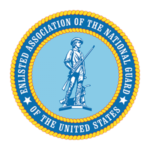To: EANGUS Members
From: EANGUS National Office
Please share the following Roll Call: Drill Weekend Talking Points with other unit members
Who is a Veteran?: Setting the Record Straight
By: Kevin Hollinger, EANGUS Legislative Director
Recently there has been attention put to the matter of whom and who is not considered a Veteran. This is important for military servicemembers because of the tangible and intangible consequences of being designated a Veteran. This is very concerning because the myths about a veteran’s identity affect current legislation and policy. I often find myself trying to justify National Guard service.
Perhaps the most critical aspect is the intangible consequence of being able to stand up in a crowd when Veterans are recognized for their service. The law states you are a peacetime Veteran if you served in the “active military, naval, or air service” on active duty that does not include active duty for training.
You do not have to be on orders for 180 days to be a Veteran, but you may have to in order to receive benefits!
Servicemembers could refer to themselves as war Veterans if they served during a period of war designated in Title 38 USC 101(12). Again you do not need a specific number of days to be considered a war Veteran. However, it would be best if you were on orders for 180 consecutive days to qualify for veterans’ preference with the federal government.
|
There is a difference between qualifying for Veteran status and qualifying for benefits due to being a Veteran. |
Veteran Status
Peacetime Veteran
38 USC 101(2) The term “veteran” means a person who served in the active military, naval, or air service and was discharged or released therefrom under conditions other than dishonorable.
38 USC 101(24) The term ‘‘active military, naval, or air service’’ includes—
(A) active duty;
(B) any period of active duty for training during which the individual concerned was disabled or died from a disease or injury incurred or aggravated in the line of duty; and(C) any period of inactive duty training during which the individual concerned was disabled or died—
(i) from an injury incurred or aggravated in the line of duty; or
(ii) from an acute myocardial infarction, a cardiac arrest, or a cerebrovascular accident occurring during such training.
The subsequent activations occurred only during wartime and national emergencies, and the numbers do not include any voluntary activations.
Berlin Crisis (1961-1962; 148,034 reservists involuntarily activated)
Cuban Missile Crisis (1962; 14,200 reservists involuntarily activated)
Haiti (1994-1996; 6,250 reservists involuntarily activated)
Bosnian peacekeeping mission (1995-2004; 31,553 reservists involuntarily activated)
Kosovo mission (1999-present; 11,485 reservists involuntarily activated through 2003)
War Veteran
38 USC 101(12) The term “veteran of any war” means any veteran who served in the active military, naval, or air service during a period of war.
Under current law, VA recognizes the following wartime periods:
» World War I (April 6, 1917 – November 11, 1918)
» World War II (December 7, 1941 – December 31, 1946)
» Korean conflict (June 27, 1950 – January 31, 1955) 1950-1953; 857,877 reservists involuntarily activated
» Vietnam era (February 28, 1961 – May 7, 1975, for Veterans who served in the Republic of Vietnam during that period; otherwise, August 5, 1964 – May 7, 1975) 1968-1969; 37,643 reservists involuntarily activate)
» Gulf War (August 2, 1990 – through a future date to be set by law or Presidential Proclamation)
Persian Gulf War (1990-1991; 238,729 reservists involuntarily activated)
Iraq (1998-2003; 6,108 reservists involuntarily activated)
Operations Noble Eagle, Enduring Freedom and Iraqi Freedom/New Dawn31 (2001-present; 896,815 reservists involuntarily and voluntarily activated as of May 27, 2014)
Veteran Status for Benefits
Once an individual qualifies for Veteran status, they may be eligible for a host of benefits if they meet other requirements. For example, a War Veteran must have 180 consecutive days of active service to qualify for 5-point “veterans preference” with the federal government.
Education assistance and home loan guarantees are additional benefits that have their qualifications before a veteran is eligible for the benefit.
As I have been in DC for about five years, having retired from the National Guard, I’m concerned that these myths are still out there and throughout the ranks in the military and lawmakers.
For more information on this or any other issues concerning the National Guard, don’t hesitate to contact EANGUS’s legislative and military policy director, Kevin Hollinger, at (202) 670-1826 kevin@eangus.org.
EANGUS would like you to participate in this Call to Action, asking the 118th Congress to re-introduce H.R. 1854, initially introduced in the 117th by Rep Ryan (R-OH) and Rep Pallazo (D-MS). The “Reserve Employers Comprehensive Relief and Uniform Incentives on Taxes Act of 2021” or the “RECRUIT Act of 2021” is an EANGUS legislative priority for encouraging employers to hire and retain National Guard and Reserve servicemembers.
The EANGUS legislative team is dedicated to helping National Guard members with USERRA and SCRA problems; we are all too familiar with their employment problems from deployments. On the other hand, we cannot blame employers because they also shoulder a burden when Guard and Reserve are on orders. During the 117th Congress, H.R. 1854 would have provided employers a tax credit, encouraging them to hire and retain Reserve Component members. The tax credit will help employers offset the financial cost of hiring temporary employees or paying overtime when servicemembers are absent.
EANGUS Member Survey
In keeping with the EANGUS tradition of presenting its members with the most pertinent information possible, we request that all members take this short twelve-question survey. Its purpose is to provide the Committee on Retiree Affairs with the feedback needed to develop our program. We’d like to target our program to not just retirees but also to those within five years of retiring. We want to ensure that everyone has access to all the programs, information, and benefits they have earned.
Your answers will guide the future of our program. Thank you!
Your feedback, please
EANGUS Healthcare Survey
EANGUS invites you to take a brief 30-second survey to provide your feedback on the importance of healthcare and your military service.
EANGUS Resources
The Foundation has received funding from USAA for the EANGUS We Care for America National Guard Emergency Relief Grant and Interest-Free Loan Program.
Go to the EANGUS-WCFA website for the criteria to apply for WCFA Grants and Interest-Free Loans.
Operation VetCare was established in 2017 by EANGUS as a program designed to assist Military Service Members, Veterans, and their families who face special issues or challenges associated with military service. This program has continued to grow over the last several years. Assistance provided through this program may vary based on the limited funds available but may assist by providing support in the form of gift cards for food, clothing, and other necessary items during a service-related crisis. Through this program, EANGUS has been able to assist hundreds of people during a time of significant need. Click the button for more information on how you can support this initiative through donations or to request assistance.














